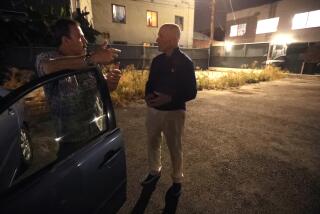Ex-Ad Executive Helps the Homeless Get on Their Feet
- Share via
With her fashionable laced black boots, close-cropped hair and confident stride, Nicole Pagourgis looks more like a thirtysomething advertising executive than a crusader for the homeless.
That’s not surprising, because not long ago, Pagourgis was living the fast-paced life of an account executive, concocting campaigns for Tide detergent and Campbell’s soup from a skyscraper office with a breathtaking view of Manhattan.
But after moving to Los Angeles in 1986 to be with her boyfriend, marrying him and having the first of their two children, Pagourgis decided she wanted to do something more meaningful with her life. Two years ago March, she and her friend, Greg A. Nathanson, general manager of KTTV and president of Fox Television Stations, started a foundation to help the homeless.
On Your Feet, the private, nonprofit Studio City-based agency has helped more than 270 people, couples and families from throughout Los Angeles County move into apartments or avoid being evicted from their houses, Pagourgis said.
Some groups own apartments in which they can lodge homeless people for several months. But this agency is unusual because it gives clients money to rent their own apartments.
“We’re very glad they’re out there,” said Judy Lawyer, housing coordinator for American Indian Housing Services in Los Angeles, one of the two dozen agencies that uses money from On Your Feet to help its own clients. “It’s a blessing.”
Tanya Tull, founder and executive director of Beyond Shelter, which has worked since 1988 to provide permanent housing and other help to the homeless, said On Your Feet is one of her group’s main funding sources, providing move-in money that is essential for homeless people to get off the streets.
“She’s very dedicated,” Tull said of Pagourgis. “She cares about quality and doing a good job.”
Pagourgis, 32, who said her salary is $20,000 per year, could easily have slipped into the comfortable lifestyle of the wife of a Universal Television executive.
Instead, she spends her days interviewing homeless clients, seeking contributions for the foundation and thinking of ways to expand her operation to help more people.
“I chose this particular cause because I think there’s such an urgent need and it’s within our means to cure this problem. There are lots of social problems, but homelessness seemed like something you could do something about,” said Pagourgis, who worked as a volunteer at homeless shelters in New York and Los Angeles while pursuing her advertising career.
“Most of the programs for the homeless--although it’s starting to change--give you a bed for a night, a week or a month, a hot meal and clothes,” Pagourgis said. “They’re temporary emergency programs, but they don’t do anything to break the cycle of disadvantage and homelessness and get these people back into society. In another month, if that cycle isn’t broken, they’re going to need another hot meal, more clothes and another bed.”
Pagourgis thought it made more sense to try to get the homeless into their own apartments. But she knew from her volunteer experience that it is difficult for a person living on the street to come up with enough money for first and last months’ rent, security and utility deposits, plus have any money left for furnishings.
After spending six months talking to the people who head existing programs, Pagourgis and Nathanson set up an agency that would help homeless people find apartments, pay move-in costs and buy basic furnishings. On average, the agency spends about $1,000 per family.
On Your Feet also monitors the client’s progress for a year, providing additional money, if necessary, for child care, food, bus passes and rent, and offering a range of services from help handling a medical problem to assistance finding a cheaper apartment, a better-paying job or planning a budget. Help can be as simple as driving a client’s children to the doctor and as complex as helping someone negotiate the welfare bureaucracy.
The agency tries to deal with a small segment of the homeless population--those who have the best chance of succeeding--carefully screening clients to weed out drug or alcohol abusers and those with acute mental problems.
The agency also tries to prevent people from becoming homeless in the first place. “Once a person is homeless, they lose all their belongings and become all that much more depressed,” Pagourgis said. “They lose their confidence and their self-esteem and a whole host of problems come up rather than just financial ones. Rather than have them become homeless and their kids know what it’s like to live in a car, we help them pay their rent.”
Miriam Nedwick, her husband, their three children and Nedwick’s elderly grandmother were about to be evicted from their $1,200-per-month rented house in Granada Hills when On Your Feet stepped in.
Pregnant with her third child, Miriam Nedwick, 25, had to leave her job as a dealer at a Bell Gardens poker club in April because “my stomach got really huge and I couldn’t reach the table.”
The baby, Genessis, was born in June and Nedwick went back to work full time at the card club in the fall, but the family still couldn’t pay the rent. The constricted housing market was undercutting sales for her husband, who had recently begun selling real estate, Nedwick said.
Finally, someone told the family about On Your Feet. Just before Christmas, the agency gave the Nedwicks some advice: Find a cheaper place to live. After the family found a $900-per-month apartment in Glendale, the organization paid $1,760 for their first month’s rent and security deposit.
Although the Nedwicks are now separated, Miriam Nedwick said she has struggled along, trying to avoid tapping the organization for further financial help. When the agency offered the Nedwick children toys for Christmas, Nedwick responded that relatives would provide.
But Nedwick said she continues to rely on the organization’s moral support and advice.
“I think it’s great. They helped me when I needed it the most,” she said. “You know, sometimes you need just that little push and you can get out on your own. I’ve been on my own for four months and so far I can do it.”
Pagourgis’ former boss, Paula Forman, executive vice president of Saatchi & Saatchi advertising agency in New York, isn’t surprised at the twist Pagourgis’ career has taken. She recalls Pagourgis as “a spectacular employee” who combined great skill in the advertising business with a social conscience.
“She always viewed herself as very fortunate,” Forman said. “She was always there for all her friends and co-workers if somebody needed anything, whether it was someone to talk to, a cup of coffee or the coat off her back.”
Using a $10,000 salary bonus from the agency, Pagourgis traveled around the world for six months before meeting her future husband, now a vice president of comedy development at Universal Television, and moving to Los Angeles to be with him. Until the birth of her baby, she worked at a local advertising firm. When the baby was 6 months old, she was about to launch her own advertising consulting business when she decided to change careers.
Nathanson, the former boss of Pagourgis’ husband, provided the agency’s initial funding of $100,000 and has continued to donate most of the agency’s funds each year. Because the agency is private and receives no public money, Pagourgis legally need not disclose the organization’s funding. But she said the agency last year raised about $300,000 and spent most of it on rental assistance, Pagourgis said.
At first, Pagourgis worked alone from a makeshift office in her house, and the agency gave money to other social service organizations. But Pagourgis soon discovered that some of the agencies were failing to monitor clients or falsifying follow-up reports, so in May she began offering direct help to clients, she said.
In June, with the agency’s caseload growing to 31 clients, Pagourgis hired a full-time social worker and rented a small suite in an office building at 11132 Ventura Blvd. that is set amid rundown motels.
The agency now has 50 of its own clients and plans to hire a second social worker, and Pagourgis devotes most of her time to fund raising, she said.
Entertainment industry figures dominate the agency’s board of directors, which includes Pagourgis; Nathanson and his wife, Teresa; his brother, Mark Nathanson, owner of Falcon Cable; Tim Disney, an independent film producer and the son of Disney vice chairman Roy Disney Jr.; and Robin Kramer, director of staff for City Councilman Richard Alatorre.
To minimize potential fraud, the agency always writes checks directly to landlords or service providers, never to the clients themselves, Pagourgis said.
But that policy is not foolproof. One woman arranged to have her rent and move-in costs paid to a man the agency later discovered was her son-in-law. The woman then moved in with her boyfriend. Pagourgis said the woman later came to the agency and asked for help after being battered by the boyfriend.
Instead of help, Pagourgis gave her a lecture. “What you did jeopardizes a program like this for everyone because people don’t want to give to a program where the money is used in a fraudulent way. You jeopardized the program for lots of people who needed it desperately,” Pagourgis recalled telling her. “I was furious,” she said. “I had to cut her loose.”
But the agency has more success stories than failures, including the 56-year-old cashier at a Canoga Park restaurant, who was evicted for not paying the rent on her Panorama City apartment. The woman had been laid off from her store cashier’s job of five years because business was slow and she was having trouble finding another job.
“I felt absolutely on the edge. I had never felt like that before--so scared. It’s humbling and very embarrassing,” the woman said. After calling every social service organization she could find, she was finally referred to On Your Feet, which last fall placed her in a small Burbank apartment.
“I honestly don’t think I could have survived on the streets or in a shelter,” said the woman, a divorced mother of three grown children who likes to crochet, read historical novels and watch television. “I don’t know what I would have done without these people.”
More to Read
Sign up for Essential California
The most important California stories and recommendations in your inbox every morning.
You may occasionally receive promotional content from the Los Angeles Times.






